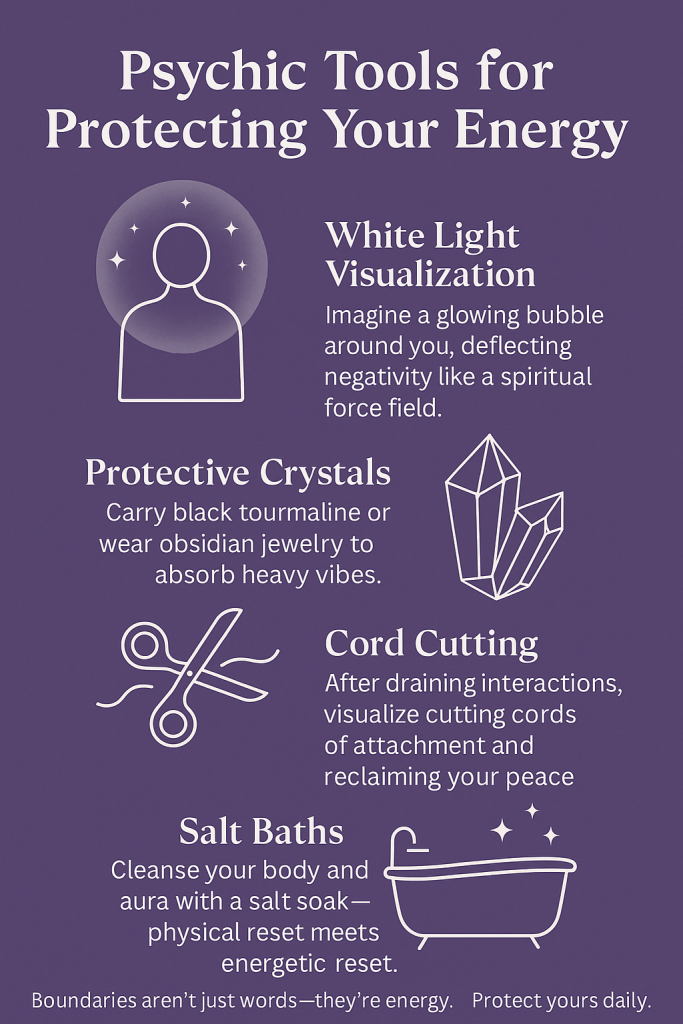Introduction: Why Difficult People Are Everywhere
Let’s be honest—we all know one. The coworker who nitpicks your every move. The family member who thrives on drama. The friend who drains your energy like a leaky faucet you can’t quite fix. Difficult people are universal, and avoiding them entirely is about as likely as avoiding Wi-Fi signals in a city.
But what if the “problem” isn’t just them—it’s the energetic exchange between you? Traditional advice says “set boundaries” or “be assertive.” That’s solid, but incomplete. From a psychic perspective, difficult people are more than annoyances; they’re teachers, karmic mirrors, and energy disruptors. And when we approach them with both practical tools and psychic insight, the result isn’t just surviving—it’s thriving.
This article will explore why difficult people show up, the archetypes they embody, how they affect your energy, and how to use psychic wisdom to protect yourself and transform conflict.
Why Difficult People Show Up in Our Lives
Ever notice how certain people push your buttons more than others? It’s not random. Sometimes, those connections are karmic—souls we’ve tangled with before.
I once read for a client who couldn’t understand why her boss seemed to target her constantly. Through a psychic session, it became clear they had clashed in multiple past lives. In one, she had been the boss’s teacher; in another, they were rivals for leadership. No wonder their relationship now carried tension—it was an unfinished story.
From a psychological lens, Psychology Today explains how toxic relationships often mirror unhealed wounds. From a psychic lens, those wounds sometimes stretch across lifetimes.
Recognizing the Archetypes of Difficult People
Instead of just labeling someone “toxic,” it helps to see their archetype. This reframing makes them easier to understand—and easier to manage.
The Critic: Always has something negative to say. Attacks your solar plexus chakra, leaving you doubting your worth.
The Energy Vampire: Leaves you exhausted after every interaction. Targets your heart chakra, pulling emotional energy.
The Control Freak: Wants everything their way. Puts pressure on your throat chakra, stifling your self-expression.
The Ghoster: Disappears when you need them most. Shakes your root chakra, making you feel unsupported.
Once you recognize the archetype, you stop personalizing the behavior. Instead of “They hate me,” it becomes, “Oh, they’re playing the Critic role.”
The Energetic Cost of Conflict
Difficult people don’t just frustrate you emotionally—they tangle your aura. Ever feel drained after an argument, like carrying a wet blanket on your chest? That’s energy entanglement.
Science backs this up. VeryWellMind notes that conflict spikes cortisol, our stress hormone, affecting sleep, focus, and health. On a psychic level, it muddies your aura, leaving you vulnerable to further emotional “hits.”
Example: A woman once described fighting with her partner, then feeling a literal heaviness in her chest for hours afterward. That wasn’t just stress—it was energy sticking to her field.
Psychic Tools for Protecting Your Energy

Boundaries are more than saying “no.” They’re energetic, too. Here are psychic tools that help:
White Light Visualization: Imagine a bubble of light surrounding you, deflecting negativity like a spiritual force field.
Protective Crystals: Black tourmaline in your pocket or obsidian jewelry helps absorb heavy vibes.
Cord Cutting: After intense interactions, visualize or meditate to cut energetic cords. One client told me she finally slept soundly after cord-cutting from her emotionally manipulative ex.
Salt Baths: Physical cleansing doubles as energetic cleansing.
As MindBodyGreen points out, energy hygiene is as vital as physical hygiene.
Communication as Energy Exchange
Words are spells. Every sentence carries vibration. That’s why how you speak to difficult people matters as much as what you say.
Instead of matching their aggression, try wrapping your words in rose-gold light. One woman tried this technique when talking to her highly critical mother. She visualized her words floating in golden bubbles. To her surprise, the conversation stayed calmer than usual.
Humor also shifts energy. As I like to say, “It’s not about biting your tongue—it’s about seasoning your words.”
Intuition as Your Compass with Difficult People
Intuition often knows whether to engage or walk away long before logic catches up. If your gut screams “don’t argue,” listen.
Example: A client wanted to confront her sister about a family issue. A psychic reading suggested silence. Days later, the sister apologized first, dissolving conflict naturally. Sometimes, the best strategy is restraint guided by intuition.
Oprah Daily emphasizes living authentically through intuition. When dealing with difficult people, that authenticity becomes a shield.
Spiritual Lessons Hidden in Conflict
Here’s the uncomfortable truth: every difficult person teaches us something.
The Critic? Teaches you self-validation.
The Energy Vampire? Teaches you to guard your heart.
The Control Freak? Teaches you to hold your voice.
The Ghoster? Teaches you resilience.
One man realized his judgmental coworker wasn’t just irritating—she reflected his own harsh inner critic. By softening toward himself, he found her jabs lost their sting.
“They’re not the test—they’re the teacher.”
Psychic Perspectives on Karmic Ties
Why do some people trigger us instantly while others barely register? Psychic wisdom says karmic ties.
I once read for a woman who felt instant dislike for her new colleague. It turned out they’d shared multiple lifetimes where betrayal had occurred. Recognizing that made her shift from anger to curiosity—she asked, “What’s the lesson this time?” That reframing alone lowered her stress.
Practical Meets Psychic—Blended Strategies
For best results, combine practical and psychic methods:
Traditional tools: Therapy, assertiveness, journaling, setting clear boundaries.
Psychic tools: Energy shielding, intuitive decision-making, cleansing rituals.
Together, they address both the outer and inner experience.
When to Let Go
Some relationships are meant to be managed, not fixed. Signs it’s time to release include constant exhaustion, repeated disrespect, and no willingness to change.
Rituals can help with closure:
Write a letter you never send.
Burn a candle while setting the intention to release.
Do a cord-cutting meditation.
A woman I once guided finally let go of a “friend” after psychic confirmation that their soul contract was complete. She described the release as both heartbreaking and freeing.
Conclusion: From Burden to Breakthrough
Dealing with difficult people will never be simple. But when you approach them not just with boundaries, but with psychic wisdom, everything shifts. They stop being burdens and start becoming breakthroughs.
So next time you encounter someone who drains, criticizes, or controls—remember this: they are not just here to challenge you. They are here to help you grow. Protect your energy, trust your intuition, and treat every difficult person as a teacher disguised in chaos.
FAQ for Psychic Wisdom for Finding Peace
How do I quickly tell if someone is “difficult” or just having a bad day?
Check for patterns. One-off tension = mood. Repeated criticism, boundary-pushing, or chaos across contexts = difficult dynamic.What’s the first psychic step before any hard conversation?
Ground and shield: three slow exhales, feet flat, visualize a white-light bubble around you. Then speak.How do I set a boundary without starting a fight?
State the limit, not the lecture. “I can talk for 10 minutes now. If it goes longer, let’s revisit tomorrow.”What if the person dismisses my feelings?
Name it and pivot. “I hear you disagree. My limit stays the same.” Don’t debate your reality.How can I stop absorbing their mood?
Imagine a dimmer switch on your chest. Turn it down to 30% during contact. Afterward, do a 60-second shake-out.Is my boss difficult—or is this a karmic lesson?
Maybe both. If the trigger feels outsized, explore karmic ties with a reading. Either way, practice clear, written boundaries.What crystals actually help during conflict?
Black tourmaline (shielding), rose quartz (soft heart), lapis lazuli (clear speech). Keep one in a pocket or on your desk.How do I handle the nonstop Critic?
Limit feedback windows and ask for specifics: “Give me one actionable change by Friday.” Reward constructive, ignore vague.What’s the best way to respond to an Energy Vampire?
Pre-set containers: “I have 5 minutes.” Offer one resource, not your entire afternoon. End with a kind close.How do I keep calm when they push every button?
Use breath math: inhale 4, exhale 6. Longer exhales downshift your nervous system so your intuition can lead.Can cord-cutting really help with an ex or coworker?
Yes, as an energetic reset. Visualize cords dissolving into light. Follow with practical changes (mute threads, new routines).What if walking away isn’t possible yet?
Create micro-space: headphones, lunch outside, a quick bathroom breath. Small exits prevent big explosions.How do I use intuition to know when to speak up?
Ask your gut a yes/no. Calm “yes” feels steady and expansive; “no” feels tight. Act on the steadier signal.How can I stop over-explaining my boundaries?
Use the rule of one: one sentence to state, one to restate, one to end. Extra words invite arguments.What script helps with controlling behavior?
“I’m comfortable with my choice.” Repeat. Do not justify. Control loses steam without fuel.How do I repair my energy after a blow-up?
Salt bath or salt-hand rinse, journal a one-page purge, then a 10-minute tech-free walk to reset your field.What if the difficult person is family?
Shift the setting, not the person: shorter visits, neutral locations, and an exit plan. Boundaries are love with edges.How do I know it’s time to leave the relationship?
Three signs: chronic disrespect, constant dread, and no mutual effort after clear requests. Leave safely and with support.Can a psychic reading really change the dynamic?
It clarifies patterns, timing, and your best next step. With that map, your choices change—and dynamics follow.What’s one daily practice to build resilience?
Morning reset: two minutes breath, one sentence intention, quick aura sweep (hand from head to heart saying, “Only love stays”).





Honestly, I find the idea of ‘blunt honesty’ being a virtue quite overrated. There’s a fine line between being honest and being downright rude. Some people use ‘bluntness’ as an excuse to be disrespectful, and this article somewhat glosses over that nuance.
This article highlights the importance of self-awareness and boundary-setting in maintaining healthy relationships. Sometimes disengaging is the best course of action.
It’s interesting to note that blunt honesty, while challenging, can sometimes be necessary for personal growth. However, managing such interactions mindfully is key.
It is true that we can’t always choose the people around us, but establishing healthy boundaries is crucial. The advice provided in this article, particularly about not taking things personally and using our own judgment, is very practical and can be applied in various situations.
I appreciate the practical steps outlined here. Filtering advice through personal judgment and seeking different perspectives are both essential strategies.
This article presents a balanced approach to dealing with blunt and difficult people. I appreciate the emphasis on self-reflection and honesty with oneself when confronted with harsh comments. It’s a good guideline for navigating complex social interactions without compromising one’s own values and comfort.
The point about seeking advice from different people is quite insightful. It recognizes the importance of diverse perspectives and the need for respect in communication. Recognizing when to disengage from harmful relationships is an important reminder for maintaining mental well-being.
What a fascinating read! I was particularly struck by the suggestion to not take things personally and to use one’s own judgment. These tips resonate well with the principles of emotional intelligence and self-reflection, which are vital for personal growth.
I found this article to be extremely insightful. It provides realistic and practical advice on handling difficult people, ensuring we maintain our peace of mind. These strategies are essential for anyone striving to navigate complex interpersonal relationships effectively.
The emphasis on not taking things personally is crucial. Understanding the context of the other person’s behavior can help in managing our reactions better.
While the advice here might sound good in theory, it fails to account for the emotional toll that dealing with blunt and harsh individuals can take. Not everyone has the luxury to calmly disengage from toxic relationships, especially in family or work contexts.
The article provides a balanced perspective on dealing with difficult people. It’s crucial to recognize the intention behind blunt honesty and to set boundaries accordingly.
Oh, great! Another guide on how to deal with people who can’t keep their unsolicited opinions to themselves. How about we just hand out muzzles instead? Might be more effective than pretending their ‘advice’ is helpful.
Comments are closed.